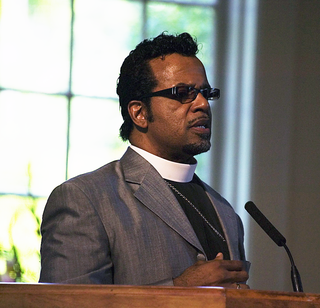A Quote by Blaise Pascal
If we let ourselves believe that man began with divine grace, that he forfeited this by sin, and that he can be redeemed only by divine grace through the crucified Christ, then we shall find peace of mind never granted to philosophers. He who cannot believe is cursed, for he reveals by his unbelief that God has not chosen to give him grace.
Related Quotes
This is the amazing story of God’s grace. God saves us by His grace and transforms us more and more into the likeness of His Son by His grace. In all our trials and afflictions, He sustains and strengthens us by His grace. He calls us by grace to perform our own unique function within the Body of Christ. Then, again by grace, He gives to each of us the spiritual gifts necessary to fulfill our calling. As we serve Him, He makes that service acceptable to Himself by grace, and then rewards us a hundredfold by grace.
If a person has grasped the meaning of God's grace in his heart, he will do justice. If he doesn't live justly, then he may say with his lips that he is grateful for God's grace, but in his heart he is far from him. If he doesn't care about the poor, it reveals that at best he doesn't understand the grace he has experienced, and at worst he has not really encountered the saving mercy of God. Grace should make you just.
The death of Christ made it possible for God to accept sinful man, and that he has, in fact, done so. Consequently, whatever separation there is between man and the benefits of God's grace is subjective in nature and exists only in man's mind and unregenerate spirit. The message man needs to hear then, is not that he simply has a suggested opportunity for salvation, but that through Christ he has, in fact, already been redeemed to God and that he may enjoy the blessing that are already his through Christ
Christ prayed for those that crucified Him: 'Father, count not this sin against them; they know not what they do.' Archdeacon Stephen prayed for those who stoned him so that the Lord would not judge this sin against them. And so we, if we wish to retain grace, must pray for our enemies. If you do not find pity on a sinner who will suffer in flames, then you do not carry the grace of the Holy Spirit, but rather an evil spirit; and while you yet live, you must free yourself from his clutches through repentance.
It is grace at the beginning, and grace at the end. So that when you and I come to lie upon our death beds, the one thing that should comfort and help and strengthen us there is the thing that helped us in the beginning. Not what we have been, not what we have done, but the Grace of God in Jesus Christ our Lord. The Christian life starts with grace, it must continue with grace, it ends with grace. Grace wondrous grace. By the grace of God I am what I am. Yet not I, but the Grace of God which was with me.
When a man is in God's grace and free from mortal sin, then everything that he does, so long as there is no sin in it, gives God glory and what does not give him glory has some, however little, sin in it. It is not only prayer that gives God glory but work. Smiting on an anvil, sawing a beam, whitewashing a wall, driving horses, sweeping, scouring, everything gives God some glory if being in his grace you do it as your duty.
The only man who has the right to say that he is justified by grace alone is the man who has left all to follow Christ. Such a man knows that the call to discipleship is a gift of grace, and that the call is inseparable from the grace. But those who try to use this grace as a dispensation from following Christ are simply deceiving themselves.
Grace stands in direct opposition to any supposed worthiness on our part. To say it another way: Grace and works are mutually exclusive. As Paul said in Romans 11:6, "And if by grace, then it is no longer by works; if it were, grace would no longer be grace." Our relationship with God is based on either works or grace. There is never a works-plus-grace relationship with Him.
The ultimate difference between God's wisdom and man's wisdom is how they relate to the glory of God's grace in Christ crucified. God's wisdom makes the glory of God's grace our supreme treasure. But man's wisdom delights in seeing himself as resourceful, self-sufficient, self determining, and not utterly dependent on God's free grace.
There is no grace more excellent than faith; no sin more execrable and abominable then unbelief. Faith is the saving grace and unbelief the damning sin. (Mark 16:16) ... Before Christ can be received, the heart must be emptied and opened: but men's heart's are full of self-righteousn ess and vain confidence (Rom 10:3).
Cheap grace is the grace we bestow on ourselves. Cheap grace is the preaching of forgiveness without requiring repentance, baptism without church discipline, Communion without confession.... Cheap grace is grace without discipleship, grace without the cross, grace without Jesus Christ, living and incarnate.
When the New Testament speaks about the fullness of grace which we find in Christ, it does not mean only forgiveness, pardon and justification. Christ has done much more for us. He died for us, but he also lived for us. Now he has sent his own Spirit to us so that we might draw on his strength. He grew in grace, and when we draw on his power we shall likewise grow in grace.







































